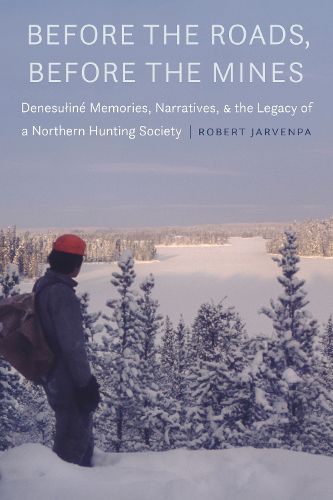Readings Newsletter
Become a Readings Member to make your shopping experience even easier.
Sign in or sign up for free!
You’re not far away from qualifying for FREE standard shipping within Australia
You’ve qualified for FREE standard shipping within Australia
The cart is loading…






Before the Roads, Before the Mines is a narrative-based ethnohistory of a Denesuline community, also known as the Chipewyan, Kesyehot'ine, or Poplar House People. The discovery of high-grade uranium deposits in northern Saskatchewan, Canada, in the mid- to late 1970s ushered in an era of mining and roadbuilding that largely replaced the traditional livelihoods of these subarctic hunter-fishers with wage labor in mining, construction, and related industries. The advent of new communications technologies and consumer goods, and a road to the outside world, created ruptures in the social fabric of the community.
Robert Jarvenpa highlights the historical experiences of middle-aged and older individuals who vividly recall a time before the roads and mines existed-when young and old alike spoke the Denesuline language and when entire families lived in a seasonally nomadic fashion in the bush. They continually invoke the past in the problematic present, a ritualized form of communication integral to resisting or adapting to the erosive changes of a rapidly industrializing resource-extraction frontier.
Jarvenpa showcases the spoken words of the Denesuline informants as a means of documenting and interpreting their historical past in the face of contemporary peril as the subarctic permafrost recedes and multinational corporations eye Indigenous lands for their minerals.
$9.00 standard shipping within Australia
FREE standard shipping within Australia for orders over $100.00
Express & International shipping calculated at checkout
Before the Roads, Before the Mines is a narrative-based ethnohistory of a Denesuline community, also known as the Chipewyan, Kesyehot'ine, or Poplar House People. The discovery of high-grade uranium deposits in northern Saskatchewan, Canada, in the mid- to late 1970s ushered in an era of mining and roadbuilding that largely replaced the traditional livelihoods of these subarctic hunter-fishers with wage labor in mining, construction, and related industries. The advent of new communications technologies and consumer goods, and a road to the outside world, created ruptures in the social fabric of the community.
Robert Jarvenpa highlights the historical experiences of middle-aged and older individuals who vividly recall a time before the roads and mines existed-when young and old alike spoke the Denesuline language and when entire families lived in a seasonally nomadic fashion in the bush. They continually invoke the past in the problematic present, a ritualized form of communication integral to resisting or adapting to the erosive changes of a rapidly industrializing resource-extraction frontier.
Jarvenpa showcases the spoken words of the Denesuline informants as a means of documenting and interpreting their historical past in the face of contemporary peril as the subarctic permafrost recedes and multinational corporations eye Indigenous lands for their minerals.